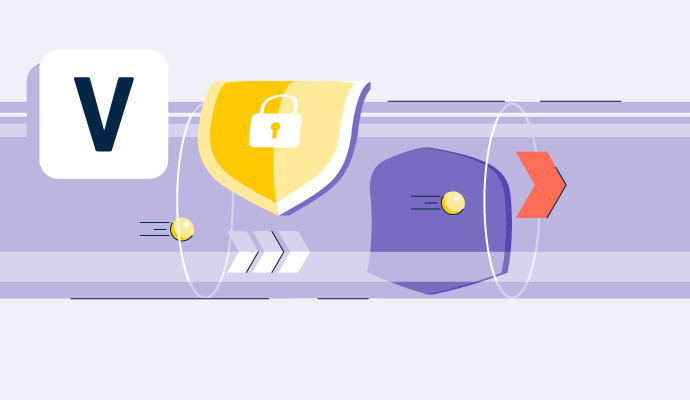O que é uma rede privada virtual?
Uma rede privada virtual (VPN) é um serviço que fornece uma conexão criptografada de um dispositivo para uma rede através da internet. As VPNs disfarçam a identidade online de um usuário, tornando mais difícil para terceiros rastrear atividades online e roubar dados. Embora amplamente utilizadas em redes corporativas, elas também são úteis para proteger informações pessoais em configurações de Wi-Fi público.
As redes privadas virtuais são amplamente utilizadas por corporações e permitem a transmissão de dados. As empresas usam software de rede privada virtual para fornecer aos funcionários acesso seguro, criptografado e remoto à rede interna da empresa.
Este software permite que os funcionários acessem aplicativos, arquivos, impressoras e outros recursos corporativos na rede corporativa como se estivessem fisicamente no escritório. Aplicar criptografia forte a todo o tráfego de entrada e saída garante que nenhum terceiro possa acessar informações confidenciais.
Tipos de redes privadas virtuais
Existem muitos tipos diferentes de redes privadas virtuais. No entanto, os dois principais tipos são:
- VPN de acesso remoto é de computador para rede. Permite que os usuários se conectem à rede da empresa de qualquer lugar, tornando o trabalho remoto mais seguro e acessível. Este tipo de VPN é ideal para uso pessoal; no entanto, pode ser inadequado para grandes corporações.
- VPN de site a site é comumente usada por empresas, especificamente grandes corporações com várias filiais. Usar VPNs de site a site para conectar escritórios corporativos a filiais é a maneira mais eficaz de garantir comunicação segura dentro e entre grandes departamentos. Vários usuários em diferentes locais podem acessar os recursos uns dos outros.
Como funciona uma rede privada virtual?
Uma VPN esconde endereços IP de usuários redirecionando-os através de um servidor remoto especificamente configurado por um host de VPN. Como o tráfego é criptografado entre o dispositivo e a rede, o provedor de serviços de internet (ISP) e outros terceiros não podem ver quais dados um usuário envia e recebe – eles permanecem privados.
As VPNs permitem que os funcionários trabalhem fora do escritório físico e se conectem com segurança à rede corporativa com laptops, smartphones e tablets.
Benefícios de uma rede privada virtual
Usar VPNs ajuda os usuários a se protegerem de hackers e cibercriminosos, pois os dados são protegidos e não podem ser decifrados. Outros benefícios de uma rede privada virtual incluem:
- Usar Wi-Fi público com segurança: Embora conveniente, usar Wi-Fi público em locais como aeroportos ou cafeterias vem com o risco de que alguém possa estar rastreando a atividade online. As VPNs ajudam a proteger dados pessoais e ocultar o histórico de navegação de potenciais hackers.
- Privacidade de dados dos ISPs: Embora os usuários estejam mais seguros usando seu Wi-Fi doméstico em vez de uma conexão pública, suas informações não estão totalmente protegidas. ISPs como Comcast e Spectrum podem acessar dados de internet e hábitos de navegação dos usuários. No entanto, as VPNs ajudam a obscurecer os endereços IP dos usuários de seus ISPs.
- Proteger dados pessoais de aplicativos online: Muitos aplicativos online foram expostos por coletar e vender dados de usuários. Portanto, usar uma VPN impede que aplicativos associem o comportamento de um usuário a um endereço IP e também pode limitar o rastreamento do histórico de navegação e localização.
- Criptografia segura: As VPNs permitem máxima segurança em redes públicas e privadas. As informações são criptografadas e quase impossíveis de decifrar.
- Disfarça a localização do usuário: Como os dados de localização demográfica vêm de outro país, terceiros não podem determinar a localização real de um usuário. Além disso, a maioria das VPNs não armazena dados das atividades dos usuários, deixando o comportamento do usuário completamente oculto.
- Transferência segura de dados: Usuários que trabalham remotamente geralmente precisam acessar e compartilhar arquivos confidenciais na rede da empresa. Para acessar a rede, as empresas geralmente exigem VPNs para garantir que a conexão seja segura e evitar vazamento de dados.

Amanda Hahn-Peters
Amanda Hahn-Peters is a freelance copywriter for G2. Born and raised in Florida, she graduated from Florida State University with a concentration in Mass Media Studies. When she’s not writing, you’ll find Amanda coaching triathletes, cuddling up with a good book, or at the theater catching the latest musical.


















